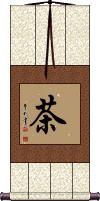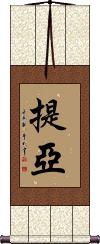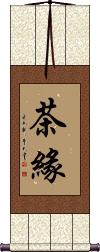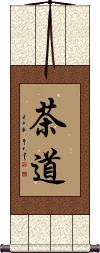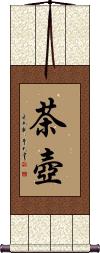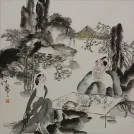Many custom options...
And formats...

Tea in Chinese / Japanese...
Buy a Tea calligraphy wall scroll here!
Personalize your custom “Tea” project by clicking the button next to your favorite “Tea” title below...
茶 means tea. It can refer to prepared tea (ready-to-drink) or dry tea leaves.
The origin of tea is China but the same character is used in Japanese Kanji, and old Korean Hanja with the exact same meaning. Japanese and Korean even borrowed the pronunciation from Chinese (pronounced “cha” in all three languages).
It's said that an early doctor (or herbologist) in ancient China kept poisoning himself as he tried different new herb concoctions. He invented tea as a means to detoxify himself as he recovered from 1 of the 76 times he nearly poisoned himself to death. Tea is seen not just as a drink but as a form of medicine used to remove impurities from the body.
The word “chai” (used in many languages to refer to various teas) is derived from this Chinese word.
茶 also means camellia, as Asian teas are often based on the leaves of camellia plant varieties.
Tea Fate
茶緣 is a special title for the tea lover. This kind of means “tea fate,” but it's more spiritual and hard to define. Perhaps the tea brought you in to drink it. Perhaps the tea will bring you and another tea-lover together. Perhaps you were already there, and the tea came to you. Perhaps it's the ah-ha moment you will have when drinking the tea.
I've been told not to explain this further, as it will either dilute or confuse the purposefully-ambiguous idea embedded in this enigma.
I happen to be the owner of a piece of calligraphy written by either the son or nephew of the last emperor of China, which is the title he wrote. It was given to me at a Beijing tea house in 2001. 茶緣 is where I learned to love tea after literally spending weeks tasting and studying everything I could about Chinese tea. I did not understand the significance of the authorship or the meaning of the title at all. Some 10 years later, I realized the gift was so profound and had such providence. Only now do I realize the value of a gift that it is too late to give proper thanks for. It was also years later that I ended up in this business and could have the artwork properly mounted as a wall scroll. It has been borrowed for many exhibitions and shows and always amazes native Chinese and Taiwanese who read the signature. This piece of calligraphy I once thought was just a bit of ink on a thin and wrinkled piece of paper, is now one of my most valued possessions. And fate has taught me to be more thankful for seemingly simple gifts.
Elements of the Tea Ceremony
Wa Kei Sei Jaku
和, 敬, 清, 寂 or Wa, Kei, Sei, Jaku are the principles of the way of tea or 茶道.
The meanings are:
Harmony 和 (wa).
Respect 敬 (kei).
Purity 清 (sei).
Tranquility 寂 (jaku).
These principles or tenets were created by tea master Sen Rikyu (1522-1591). More about these ideas: Chanoyu
The Way of Tea
茶道 means The Way of Tea (literally, “tea way”) in Chinese and Japanese.
This may refer to a tea ceremony or a general lifestyle of tea preparation and drinking.
In Japanese, this can be pronounced sadō or chadō (seems that sadō refers more often to a tea ceremony, and chadō when it's the Way of Tea).
茶道 is also used in the Buddhist context with the same meaning as the Way of Tea.
Tea Pot
Camellia
カメリア is the name Camellia in Japanese.
This sounds like Camellia, but does not mean the camellia plant or leaf.
Instead of these characters, you may want to go with the name of the plant. Of course, camellia also means tea, as varieties of camellia plants provide the leaves for many kinds of Chinese and Japanese teas.
Note: Because this title is entirely Japanese Katakana, it should be written by a Japanese calligrapher.
This in-stock artwork might be what you are looking for, and ships right away...
Decorative Chinese Tea Philosophy Painting
Discounted Blemished
Gallery Price: $61.00
Your Price: $33.88
Gallery Price: $60.00
Your Price: $36.88
Gallery Price: $61.00
Your Price: $33.88
Gallery Price: $178.00
Your Price: $98.88
Gallery Price: $60.00
Your Price: $36.88
Not the results for tea that you were looking for?
Below are some entries from our dictionary that may match your tea search...
| Characters If shown, 2nd row is Simp. Chinese |
Pronunciation Romanization |
Simple Dictionary Definition |
茶 see styles |
chá cha2 ch`a cha cha ちゃ |
More info & calligraphy: Tea(1) (See お茶・1) tea; (2) tea plant (Camellia sinensis); (3) (See 茶道) tea preparation; making tea; (4) (abbreviation) (See 茶色) brown; (noun or adjectival noun) (5) (archaism) (See 茶化す) mockery; (surname, given name) Cha Tea; tea-leaves; translit. ja, jha. |
茶壺 茶壶 see styles |
chá hú cha2 hu2 ch`a hu cha hu chatsubo ちゃつぼ |
More info & calligraphy: Tea Pottea jar; tea urn |
茶道 see styles |
chá dào cha2 dao4 ch`a tao cha tao chadou / chado ちゃどう |
More info & calligraphy: The Way of Teatea ceremony; Way of Tea; sadō; (place-name) Chadō the way of tea |
タヒる see styles |
tapiru タピる |
(Godan verb with "ru" ending) (slang) (See タピオカティー) to drink bubble tea |
チャイ see styles |
chai チャイ |
More info & calligraphy: Chay |
和敬清寂 see styles |
wakeiseijaku / wakesejaku わけいせいじゃく |
More info & calligraphy: Elements of the Tea Ceremony |
卓 see styles |
zhuó zhuo2 cho masaru まさる |
outstanding (1) table; desk; (counter) (2) (たく only) counter for tables, desks, etc.; (3) (しょく only) {Buddh} offering table before an altar (sometimes used in tea ceremony); (4) (しょく only) (abbreviation) (See 卓香炉) tabletop incense burner; (given name) Masaru Lofty, tall erect. |
寮 see styles |
liáo liao2 liao ryou / ryo りょう |
hut; shack; small window; variant of 僚[liao2] (1) hostel; dormitory; (2) (archaism) (See 律令制) bureau (government department beneath a ministry under the ritsuryō system); (3) (archaism) (See 茶寮・1) tea-ceremony room; (4) (archaism) (See 別荘・1) villa; (surname, given name) Ryō A hut, study, monastery; fellow-student. |
棗 枣 see styles |
zǎo zao3 tsao natsume なつめ |
(bound form) jujube; Chinese date (Zizyphus jujuba) (1) (kana only) jujube (Ziziphus jujuba); Chinese date; red date; (2) small tea caddy (tea ceremony); (surname, female given name) Natsume |
檟 槚 see styles |
jiǎ jia3 chia |
Catalpa, a genus of mostly deciduous trees; old term for Camellia sinensis, the tea plant 茶; also called Thea sinensis; small evergreen shrub (Mallotus japonicus) |
沏 see styles |
qī qi1 ch`i chi |
to steep (tea) |
烹 see styles |
pēng peng1 p`eng peng |
to boil; to brew (tea); to cook by briefly stir-frying and then mixing in sauce; (old) to boil to death (judicial punishment in ancient times) |
燒 烧 see styles |
shāo shao1 shao shō |
to burn; to cook; to stew; to bake; to roast; to heat; to boil (tea, water etc); fever; to run a temperature; (coll.) to let things go to one's head To burn. |
篩 筛 see styles |
shāi shai1 shai furui ふるい |
(bound form) a sieve; to sieve; to sift; to filter; to eliminate through selection; to warm a pot of rice wine (over a fire or in hot water); to pour (wine or tea); (dialect) to strike (a gong) (1) sieve; sifter; screen; (2) screening (jobs, candidates, etc.) |
翻 see styles |
fān fan1 fan hapaki はぱき |
to turn over; to flip over; to overturn; to rummage through; to translate; to decode; to double; to climb over or into; to cross (irregular okurigana usage) waste-water container (tea ceremony); (surname) Hapaki 繙 To translate, interpret. |
茗 see styles |
míng ming2 ming mei / me めい |
Thea sinensis; young leaves of tea (See 茶・ちゃ・1) tea (esp. picked late); (female given name) Mei |
詰 诘 see styles |
jié jie2 chieh sakizume さきづめ |
(bound form) to question closely; to interrogate (n,suf) (1) stuffing; packing; (2) end (esp. the foot of a bridge); (3) lowest-ranking guest at tea ceremony; (4) tea master; (5) endgame (esp. in shogi or used figuratively); (6) (abbreviation) sweet eel sauce; (7) (archaism) middle-aged woman; (suffix noun) (8) appointment to a particular workplace; (9) using as the sole ground of judgement (judgment); (10) continuing; keep doing for period of time; (surname) Sakizume to reprove |
釃 酾 see styles |
shī shi1 shih |
(literary) to filter (wine); to pour (wine or tea); to dredge; also pr. [shai1]; Taiwan pr. [si1] |
釅 酽 see styles |
yàn yan4 yen |
(of tea, wine etc) strong; (of ink, aroma etc) thick; (of a color) deep; rich |
鐶 镮 see styles |
huán huan2 huan tamaki たまき |
(ancient weight); metal ring (1) ring; link; (2) open spirals of heavy metal wire twisted into a kettle and used to lift it (tea ceremony); (given name) Tamaki A metal ring; a ring. |
お八 see styles |
oyatsu おやつ |
(1) (kana only) between-meal snack; (2) mid-afternoon (around 3 o'clock) snack; afternoon refreshment; afternoon tea |
お茶 see styles |
ocha おちゃ |
(1) (polite language) tea (usu. green); (2) tea break (at work); (3) tea ceremony |
お詰 see styles |
otsume おつめ |
(1) lowest-ranking guest at tea ceremony; (2) tea master |
マテ see styles |
mate マテ |
{food} mate (drink); maté; yerba mate; Paraguay tea; (personal name) Mate |
七事 see styles |
qī shì qi1 shi4 ch`i shih chi shih shichiji しちじ |
(archaic) the seven duties of a sovereign (abbreviation) (See 七事式・しちじしき) seven tea ceremony procedures of the Senke school |
亭主 see styles |
teishu / teshu ていしゅ |
(1) household head; master; host (e.g. of a tea gathering); innkeeper; owner (e.g. of a hotel); (2) husband |
仕服 see styles |
shifuku しふく |
silk pouch with drawstring for holding a tea caddy (tea ceremony) |
仕覆 see styles |
shifuku しふく |
silk pouch with drawstring for holding a tea caddy (tea ceremony) |
冠茶 see styles |
kabusecha かぶせちゃ |
kabusecha; mild green tea which has been lightly screened from sunlight for 1-3 weeks before picking |
冷茶 see styles |
reicha / recha れいちゃ |
cold tea; cold brew tea |
Click here for more tea results from our dictionary
The following table may be helpful for those studying Chinese or Japanese...
| Title | Characters | Romaji (Romanized Japanese) | Various forms of Romanized Chinese | |
| Tea | 茶 | cha | chá / cha2 / cha | ch`a / cha |
| Tea | 提亞 提亚 | tí yà / ti2 ya4 / ti ya / tiya | t`i ya / tiya / ti ya | |
| Tea Fate | 茶緣 茶缘 | chá yuán / cha2 yuan2 / cha yuan / chayuan | ch`a yüan / chayüan / cha yüan | |
| Elements of the Tea Ceremony | 和敬清寂 | wa kei sei jaku wakeiseijaku | ||
| The Way of Tea | 茶道 | cha dou / chadou / cha do | chá dào / cha2 dao4 / cha dao / chadao | ch`a tao / chatao / cha tao |
| Tea Pot | 茶壺 茶壶 | cha tsubo / chatsubo | chá hú / cha2 hu2 / cha hu / chahu | ch`a hu / chahu / cha hu |
| Camellia | カメリア | kameria | ||
| In some entries above you will see that characters have different versions above and below a line. In these cases, the characters above the line are Traditional Chinese, while the ones below are Simplified Chinese. | ||||
Successful Chinese Character and Japanese Kanji calligraphy searches within the last few hours...
